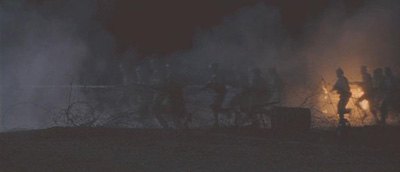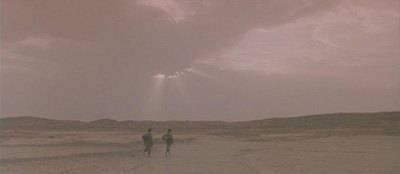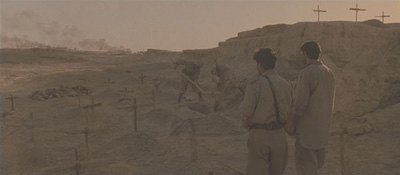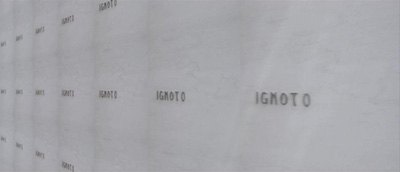| Reviews & Columns |
|
Reviews DVD TV on DVD Blu-ray 4K UHD International DVDs In Theaters Reviews by Studio Video Games Features Collector Series DVDs Easter Egg Database Interviews DVD Talk Radio Feature Articles Columns Anime Talk DVD Savant Horror DVDs The M.O.D. Squad Art House HD Talk Silent DVD
|
DVD Talk Forum |
|
|
| Resources |
|
DVD Price Search Customer Service #'s RCE Info Links |
|
Columns
|
|
|
El Alamein: The Line of Fire
Wellspring // Unrated // August 16, 2005
List Price: $26.98 [Buy now and save at Amazon]
In 1942, after a crushing defeat in France and the loss of Singapore to Japan, British forces produced Germany's first major defeat at El Alamein, in northwestern Egypt. It was an unqualified success, and signaled to the British that the war was not hopeless. As Churchill later remarked, "Before Alamein we never had a victory; after Alamein we never had a defeat."
 Forgotten by history, however, are the Italian troops that fought there. These were men who were despised by both the Germans and the British, and propagandized as cowards because many never supported the war in the first place. El Alamein: The Line of Fire, a film by Enzo Monteleone based on first-person accounts, is a story from their point of view. War stories generally aren't told from the side of the losers, but maybe more should be. The losers are at least more candid.
Forgotten by history, however, are the Italian troops that fought there. These were men who were despised by both the Germans and the British, and propagandized as cowards because many never supported the war in the first place. El Alamein: The Line of Fire, a film by Enzo Monteleone based on first-person accounts, is a story from their point of view. War stories generally aren't told from the side of the losers, but maybe more should be. The losers are at least more candid.
As the film begins, Private Serra (Paolo Briguglia) is a fresh-faced university volunteer when he arrives at his post in the African desert, a barren expanse of nothing guarded by Lieutenant Fiore's (Emilio Solfrizzi) Pavia infantry division. On the southernmost edge of the Axis line, bordered by the uncrossable Qattara Depression which even the Bedouin nomads avoid, they are an afterthought to Axis commanders focused on the north. Serra is assigned to the command of Sergeant Rizzo (an extremely likable Pierfrancesco Favino) and quickly learns that the greatest threats in the battle are not the British forces that are slowly picking off their men with snipers and 88 mm artillery fire, but dehydration, dysentery, and an all-consuming hopelessness that permeates every aspect of their desert existence. Outgunned and barely supplied, they exist somewhere between life and death as they struggle to hold onto their will to survive.
 Naturally, the men are grateful for anything that punctuates the monotony. In one scene, Serra and the others are sent on a mission to the north, behind the front lines, and decide to take a 60 km "detour" to the Mediterranean ocean. Upon seeing the beach, they run down and jump in with childlike glee... only to be brought back to reality when they are found out by another regiment and informed that the entire beach is mined.
Naturally, the men are grateful for anything that punctuates the monotony. In one scene, Serra and the others are sent on a mission to the north, behind the front lines, and decide to take a 60 km "detour" to the Mediterranean ocean. Upon seeing the beach, they run down and jump in with childlike glee... only to be brought back to reality when they are found out by another regiment and informed that the entire beach is mined.
But moments away from the trench are few and far between, and as the war goes on, it becomes more and more apparent that the upper ranks are willfully blind to the facts of their situation. In their fantasy victory is always near, even when their troops are in retreat. In a later scene, a small convoy bearing Mussolini's horse and massive amounts of shoe polish gets lost and finds its way to the front line. "It's for the victory parade, when we march on Alexandria," the driver tells them. After years of gruel, the soldiers are more interested in eating the horse than polishing their shoes for a celebration that will never come.
Eventually, the British finally break through the Axis line. The Pavia regiment is abandoned altogether, then, condemned to wander in the desert on foot to their next post, only to be told that that has changed to some other location, and then arriving at that location and being told it has changed yet again.
 I won't spoil the end – other than to say that these movies always end the same way – but it's done well enough that it can be forgiven. Regardless, El Alamein is a great film, and can be favorably compared to most any "typical" war movie.
I won't spoil the end – other than to say that these movies always end the same way – but it's done well enough that it can be forgiven. Regardless, El Alamein is a great film, and can be favorably compared to most any "typical" war movie.
Video:
El Alamein won three Italian Oscars (Best Editing, Best Sound Design, and Best Photography), and it's not hard to see why. The film, shot at 2.35:1 (anamorphic) and beautifully composed, takes advantage of the endless African deserts to achieve a truly epic look.
The daytime scenes skew towards the yellow and red parts of the spectrum quite a bit, though (go figure, the movie takes place in the desert), but some scenes did so much so that I'm pretty sure they were color-adjusted for visual effect. Also, some of the nighttime scenes are very dark, and on an incorrectly-configured set you might not see anything at all.
Audio:
The 5.1 Dolby surround is nicely balanced between highs and lows, and although there aren't many battles in the film, there is plenty of random artillery fire for your subwoofer to chew on. There's also a truly superb part when British tanks advance in the darkness – one of those rare times in film when sound alone has the power to evoke a visceral feeling of terror.
The film is often quiet, with occasional atmospheric music in the background. There are, however, two very good songs towards the end, with the memorable credits theme framing the movie with an instrumental version at the beginning. The film is entirely in Italian with optional English subtitles. A 2.0 stereo mix is also available.
 Extras:
Extras:
Not much here. A five-minute studio "behind the scenes" featurette gives the director and lead actors a few moments to talk about the film and their characters between scenes from the movie. There are also four television spots and filmographies. Trailers for other movies round it out.
Conclusion:
Anti-war war movies are nothing new, but El Alamein: The Line of Fire distinguishes itself from most with great acting and beautiful cinematography. It's a terrific film. Highly recommended.
 Forgotten by history, however, are the Italian troops that fought there. These were men who were despised by both the Germans and the British, and propagandized as cowards because many never supported the war in the first place. El Alamein: The Line of Fire, a film by Enzo Monteleone based on first-person accounts, is a story from their point of view. War stories generally aren't told from the side of the losers, but maybe more should be. The losers are at least more candid.
Forgotten by history, however, are the Italian troops that fought there. These were men who were despised by both the Germans and the British, and propagandized as cowards because many never supported the war in the first place. El Alamein: The Line of Fire, a film by Enzo Monteleone based on first-person accounts, is a story from their point of view. War stories generally aren't told from the side of the losers, but maybe more should be. The losers are at least more candid.As the film begins, Private Serra (Paolo Briguglia) is a fresh-faced university volunteer when he arrives at his post in the African desert, a barren expanse of nothing guarded by Lieutenant Fiore's (Emilio Solfrizzi) Pavia infantry division. On the southernmost edge of the Axis line, bordered by the uncrossable Qattara Depression which even the Bedouin nomads avoid, they are an afterthought to Axis commanders focused on the north. Serra is assigned to the command of Sergeant Rizzo (an extremely likable Pierfrancesco Favino) and quickly learns that the greatest threats in the battle are not the British forces that are slowly picking off their men with snipers and 88 mm artillery fire, but dehydration, dysentery, and an all-consuming hopelessness that permeates every aspect of their desert existence. Outgunned and barely supplied, they exist somewhere between life and death as they struggle to hold onto their will to survive.
 Naturally, the men are grateful for anything that punctuates the monotony. In one scene, Serra and the others are sent on a mission to the north, behind the front lines, and decide to take a 60 km "detour" to the Mediterranean ocean. Upon seeing the beach, they run down and jump in with childlike glee... only to be brought back to reality when they are found out by another regiment and informed that the entire beach is mined.
Naturally, the men are grateful for anything that punctuates the monotony. In one scene, Serra and the others are sent on a mission to the north, behind the front lines, and decide to take a 60 km "detour" to the Mediterranean ocean. Upon seeing the beach, they run down and jump in with childlike glee... only to be brought back to reality when they are found out by another regiment and informed that the entire beach is mined.But moments away from the trench are few and far between, and as the war goes on, it becomes more and more apparent that the upper ranks are willfully blind to the facts of their situation. In their fantasy victory is always near, even when their troops are in retreat. In a later scene, a small convoy bearing Mussolini's horse and massive amounts of shoe polish gets lost and finds its way to the front line. "It's for the victory parade, when we march on Alexandria," the driver tells them. After years of gruel, the soldiers are more interested in eating the horse than polishing their shoes for a celebration that will never come.
Eventually, the British finally break through the Axis line. The Pavia regiment is abandoned altogether, then, condemned to wander in the desert on foot to their next post, only to be told that that has changed to some other location, and then arriving at that location and being told it has changed yet again.
 I won't spoil the end – other than to say that these movies always end the same way – but it's done well enough that it can be forgiven. Regardless, El Alamein is a great film, and can be favorably compared to most any "typical" war movie.
I won't spoil the end – other than to say that these movies always end the same way – but it's done well enough that it can be forgiven. Regardless, El Alamein is a great film, and can be favorably compared to most any "typical" war movie.Video:
El Alamein won three Italian Oscars (Best Editing, Best Sound Design, and Best Photography), and it's not hard to see why. The film, shot at 2.35:1 (anamorphic) and beautifully composed, takes advantage of the endless African deserts to achieve a truly epic look.
The daytime scenes skew towards the yellow and red parts of the spectrum quite a bit, though (go figure, the movie takes place in the desert), but some scenes did so much so that I'm pretty sure they were color-adjusted for visual effect. Also, some of the nighttime scenes are very dark, and on an incorrectly-configured set you might not see anything at all.
Audio:
The 5.1 Dolby surround is nicely balanced between highs and lows, and although there aren't many battles in the film, there is plenty of random artillery fire for your subwoofer to chew on. There's also a truly superb part when British tanks advance in the darkness – one of those rare times in film when sound alone has the power to evoke a visceral feeling of terror.
The film is often quiet, with occasional atmospheric music in the background. There are, however, two very good songs towards the end, with the memorable credits theme framing the movie with an instrumental version at the beginning. The film is entirely in Italian with optional English subtitles. A 2.0 stereo mix is also available.
 Extras:
Extras:Not much here. A five-minute studio "behind the scenes" featurette gives the director and lead actors a few moments to talk about the film and their characters between scenes from the movie. There are also four television spots and filmographies. Trailers for other movies round it out.
Conclusion:
Anti-war war movies are nothing new, but El Alamein: The Line of Fire distinguishes itself from most with great acting and beautiful cinematography. It's a terrific film. Highly recommended.
|
| Popular Reviews |
| Sponsored Links |
|
|
| Sponsored Links |
|
|
| Release List | Reviews | Shop | Newsletter | Forum | DVD Giveaways | Blu-Ray | Advertise |
|
Copyright 2024 DVDTalk.com All Rights Reserved. Legal Info, Privacy Policy, Terms of Use,
Manage Preferences,
Your Privacy Choices | |||||||














